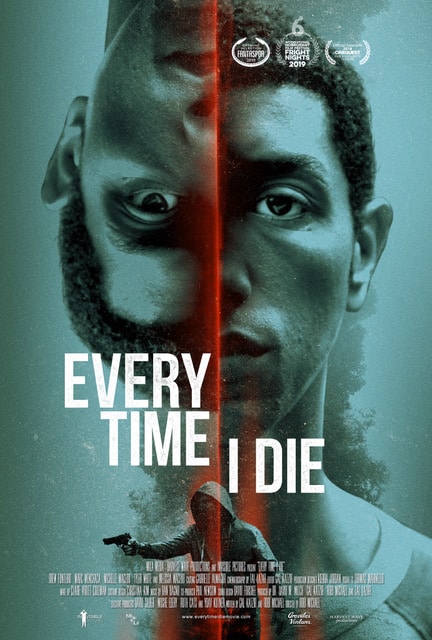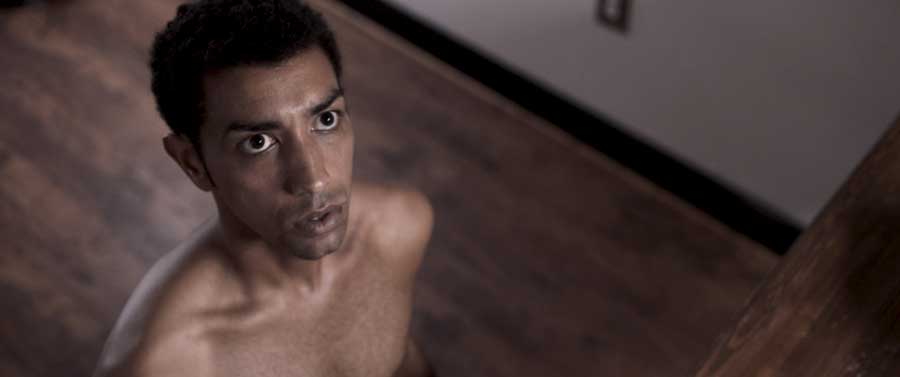
Explorations of mental illness – particularly fractured selves – are not new in horror, but as they go there’s nothing quite like Every Time I Die. It’s a discomfiting watch which splices intense depictions of mental breakdown with supernatural elements, reaching towards a new mythos of life and death. The resulting film is eerie and difficult to predict – something which is a boon, in and of itself.
Starting with a traumatic, but seemingly instantly-forgotten dream, Sam (Drew Fonteiro) is clearly a troubled young man. Waking alongside a woman called Mia (Melissa Macedo), it seems that their relationship is a non-starter; not only can she not leave quick enough, but we soon see why – she is meeting her husband, Tyler, who is returning from a tour of duty. So that’s Sam’s home life; his challenging day job as a paramedic clearly adds additional strain, though his co-worker Jay (Marc Menchaca) is there to support him. Having clearly got through a lot of problems of his own via his own blend of mordant philosophy and medication, Jay does know something of Sam’s feelings of alienation, though for Sam bouts of lost time are growing more and more frequent. Meanwhile, memories of the loss of someone close to him seem to be rising to the surface, adding to his feelings of dislocation and confusion.

What could add exponentially to all of this? Well, how about a weekend at a lakeside retreat with Jay, Jay’s wife Poppy (Michelle Macedo), and Popppy’s sister Mia, and her husband? After Jay talks him into what was only ever a very bad idea, Sam’s time at the lake reveals for everyone the intensity of his issues, so he decides to leave early; however, an altercation at the roadside leads to a sudden, shocking escalation of events. Where a story seems to end, it instead segues into something else, leading onward into a spiralling, overall effective and changeable sequence of developments. There’s a strong, often unpleasant sense of unreality here: time moves erratically, gaps and blackouts alienate the audience just as much as they do Sam, and it’s impossible not to feel for Sam, who comes across as an authentically vulnerable, haunted man, trying to piece himself together whilst also coming to terms with his past. As different characters move to the fore, their plausibility (and the plausibility of the situation suggested to us) is universally strong, which is no mean feat given the direction the plot takes.
Overall, Every Time I Die has a rather languid, sombre tone, which makes the occasional, rapid changes of pace and action genuinely unsettling, jerking the viewer into a sense of alarm. The character of Tyler is fundamental in all of this; he’s an impressively odious, self-serving character whose jealousies and issues precipitate chaos and risk for everyone else. If Sam is an easy character to empathise with, then Tyler Fleming’s performance places him as an excellent antagonist. But there is far more to this film, with its interesting handling of the notions of life and death, ideas of consciousness and personhood interwoven into the narrative (but not unquestioningly presented as a boon; in this film, knowing everything can itself be terrifying). There are some genuine moments of dread here, as well as some redemption by the time we come to the film’s ending.
Whilst the film does feel a little protracted in places, it’s largely successful at what it sets out to do. My resounding feeling having watched the film was that it’s an uncomfortable watch, overarchingly sad, but with interesting ideas, a genuine sense of unsettling mystery and a stylish way of allowing those ideas to play out.
Every Time I Die played as part of the Soho Horror Festival’s ‘SoHome’ virtual fest. For more details, check out @SohoHorrorFest on Twitter.
